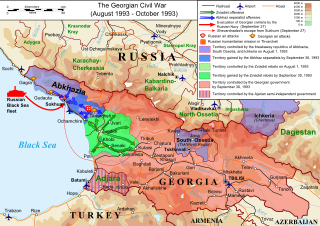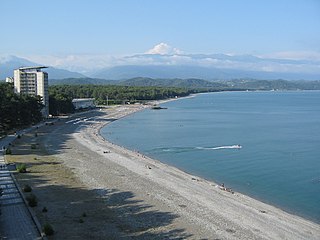
The United Nations Observer Mission in Georgia (UNOMIG) was established by United Nations Security Council Resolution 858 on 24 August 1993 to verify compliance with a 27 July 1993 ceasefire agreement between the Republic of Georgia and forces in Abkhazia with special attention given to the situation in the city of Sukhumi, Georgia. It was also to investigate reports of ceasefire violations, attempt to resolve such incidents with the parties involved, and to report to the Secretary-General of the United Nations on the implementation of its mandate. 88 military advisors were authorized to be deployed to the region. It ended on 15 June 2009, when Russia vetoed an extension of the mission. The last observers left the region on 15 July 2009.

United Nations Security Council resolution 854, adopted unanimously on 6 August 1993, after recalling Resolution 849 (1993) which concerned a deployment of military observers if a ceasefire was observed between Abkhazia and Georgia, the Council noted that a ceasefire had been signed and approved a dispatch of 10 military observers to the area to observe the implementation of the ceasefire.

United Nations Security Council resolution 858, adopted unanimously on 24 August 1993, after recalling resolutions 849 (1993) and 854 (1993) and noting a ceasefire between Abkhazia and Georgia and commitments to withdraw forces, the council established the United Nations Observer Mission in Georgia (UNOMIG) for an initial period of 90 days pending further extension.

United Nations Security Council resolution 876, adopted unanimously on 19 October 1993, after reaffirming resolutions 849 (1993), 854 (1993) and 858 (1993) concerning the Georgian–Abkhazian war, the council determined that the situation continued to constitute a threat to international peace and security.

United Nations Security Council resolution 881, adopted unanimously on 4 November 1993, after reaffirming resolutions 849 (1993), 854 (1993), 858 (1993) and 876 (1993) concerning the Georgian–Abkhazian war, the Council extended the mandate of the United Nations Observer Mission in Georgia (UNOMIG) until 31 January 1994.

United Nations Security Council resolution 892, adopted unanimously on 22 December 1993, after reaffirming resolutions 849 (1993), 854 (1993), 858 (1993), 876 (1993) and 881 (1993) on the Georgian–Abkhazian war and Resolution 868 (1993) concerning the safety of United Nations peacekeepers, the council discussed the phased deployment of 50 military observers in Georgia.

United Nations Security Council resolution 896, adopted unanimously on 31 January 1994, after reaffirming resolutions 849 (1993), 854 (1993), 858 (1993), 876 (1993), 881 (1993) and 892 (1993) on the Georgian–Abkhazian war and Resolution 868 (1993) concerning the safety of United Nations peacekeepers, the Council considered the possible establishment of peacekeeping force in Abkhazia and Georgia, and discussed the peace process.

United Nations Security Council resolution 901 was adopted unanimously on 4 March 1994. After reaffirming resolutions 849 (1993), 854 (1993), 858 (1993), 876 (1993), 881 (1993), 892 (1993) and 896 (1994), the council extended the mandate of the United Nations Observer Mission in Georgia (UNOMIG) until 31 March 1994.

United Nations Security Council resolution 906, adopted unanimously on 25 March 1994, after reaffirming resolutions 849 (1993), 854 (1993), 858 (1993), 876 (1993), 881 (1993), 892 (1993), 896 (1994) and 901 (1994), the council regretted that no agreement on a political settlement had been made between Abkhazia and Georgia, and extended the mandate of the United Nations Observer Mission in Georgia (UNOMIG) until 30 June 1994.

United Nations Security Council resolution 934, adopted unanimously on 30 June 1994, after reaffirming resolutions 849 (1993), 854 (1993), 858 (1993), 876 (1993), 881 (1993), 892 (1993), 896 (1994), 901 (1994) and 906 (1994), the Council noted the talks between Abkhazia and Georgia, and extended the mandate of the United Nations Observer Mission in Georgia (UNOMIG) until 21 July 1994.

United Nations Security Council resolution 937, adopted on 21 July 1994, after reaffirming resolutions 849 (1993), 854 (1993), 858 (1993), 876 (1993), 881 (1993), 892 (1993), 896 (1994), 901 (1994), 906 (1994) and 934 (1994), the Council expanded the United Nations Observer Mission in Georgia (UNOMIG) to include co-operation with the Commonwealth of Independent States (CIS) and extended its mandate until 13 January 1995.

United Nations Security Council resolution 971, adopted unanimously on 12 January 1995, after reaffirming resolutions 849 (1993), 854 (1993), 858 (1993), 876 (1993), 881 (1993), 892 (1993), 896 (1994), 901 (1994), 906 (1994), 934 (1994) and 937 (1994), the Council extended the United Nations Observer Mission in Georgia (UNOMIG) until 15 May 1995.

United Nations Security Council resolution 993, adopted unanimously on 12 May 1995, after reaffirming all resolutions on Georgia, particularly 971 (1995), the Council discussed efforts for a political settlement between Georgia and Abkhazia and extended the mandate of the United Nations Observer Mission in Georgia (UNOMIG) until 12 January 1996.

United Nations Security Council resolution 1036, adopted unanimously on 12 January 1996, after reaffirming all resolutions on Georgia, particularly 993 (1995), the Council discussed efforts for a political settlement between Georgia and Abkhazia and extended the mandate of the United Nations Observer Mission in Georgia (UNOMIG) for another six months until 12 July 1996.

United Nations Security Council resolution 1065, adopted unanimously on 12 July 1996, after reaffirming all resolutions on Georgia, particularly 1036 (1996), the Council discussed efforts for a political settlement between Georgia and Abkhazia and extended the mandate of the United Nations Observer Mission in Georgia (UNOMIG) until 31 January 1997.

United Nations Security Council resolution 1427, adopted unanimously on 29 July 2002, after reaffirming all resolutions on Abkhazia and Georgia, particularly Resolution 1393 (2002), the Council extended the mandate of the United Nations Observer Mission in Georgia (UNOMIG) until 31 January 2003.

United Nations Security Council resolution 1582, adopted unanimously on 28 January 2005, after reaffirming all resolutions on Abkhazia and Georgia, particularly Resolution 1554 (2004), the council extended the mandate of the United Nations Observer Mission in Georgia (UNOMIG) until 31 July 2005.

United Nations Security Council resolution 1615, adopted unanimously on 29 July 2005, after reaffirming all resolutions on Abkhazia and Georgia, particularly Resolution 1582 (2005), the council extended the mandate of the United Nations Observer Mission in Georgia (UNOMIG) until 31 January 2006.

United Nations Security Council Resolution 1666, adopted unanimously on March 31, 2006, after reaffirming all resolutions on Abkhazia and Georgia, particularly Resolution 1615 (2005), the Council extended the mandate of the United Nations Observer Mission in Georgia (UNOMIG) until October 15, 2006.

United Nations Security Council Resolution 1716, adopted unanimously on October 13, 2006, after reaffirming all resolutions on Abkhazia and Georgia, particularly Resolution 1666 (2006), the Council extended the mandate of the United Nations Observer Mission in Georgia (UNOMIG) until April 15, 2007.

















